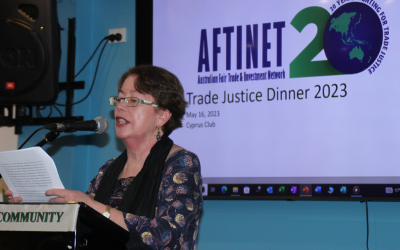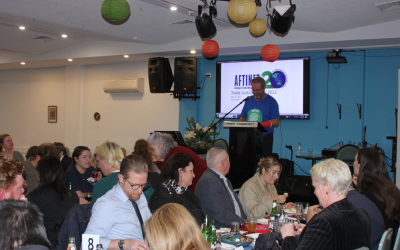Dr Patricia Ranald AFTINET Convener, gave this speech to the AFTINET trade justice dinner on May 16, 2023
The Australian Fair Trade and Investment Network (AFTINET) has campaigned for over 20 years for trade justice. We are not against trade but support fair trade based on human rights, labour rights and environmental standards. We are against trade deals being made in secrecy and want a more open and democratic trade process. The pandemic dramatically exposed the flaws in the extreme neoliberal trade theory which says each country should only produce its most efficient exports and import everything else, with no local industry policy, and minimal taxes and government regulation. This would leave Australia as a farm and a quarry with minimal public services.
Governments need active policies to support essential industries, including renewable energy industries, and to provide and regulate essential services like health and education. Trade agreements should improve peoples’ lives and should not prevent governments from regulating in the public interest in areas like health and the environment.
During the pandemic we campaigned for both Liberal and Labor governments to support a temporary waiver on World Trade Organization intellectual property rules that gave a few global companies 20-year monopolies on COVID vaccines and treatments. These were sold mostly to high income countries at high prices, resulting in very low vaccination rates for low-income countries, which remain below 30% even today. We are still campaigning for Australia to support more equitable access to COVID- related vaccines and treatments for low-income countries in the World Trade Organization and in the Pandemic Treaty now being negotiated by the World Health Organization.
The election of the Labor government last year brought the promise of more progressive trade policies. We campaigned successfully for Labor, the Greens and other minor parties to adopt such policies before the election. We published a pre-election scorecard and did media work linking issues in the election debate to trade issues. These policies include a more open and accountable trade process, excluding foreign investor rights to sue governments, equitable access to pandemic medicines and excluding longer monopolies on all medicines, and retaining local labour market testing and measures to prevent the exploitation of temporary workers. Labor also pledged to include enforceable labour rights and environmental standards in trade agreements.
The challenge now is to hold the government to account and ensure that these policies are implemented.
We have met with the new Trade Minister Don Farrell and Assistant Trade Minister Tim Ayres, met with the Greens trade spokesperson Senator Dorinda Cox and with key independents like David Pocock, and briefed other parliamentarians.
We are making progress in some of these areas, but as always there is pushback from business for their agenda, and in some cases cautious advice against change from the Department of Foreign Affairs and Trade, in Sir Humphrey mode.
On a more open process, we are receiving more briefings from the Department about current trade negotiations. However, these briefings are still limited by the fact that we do not have access to the detailed negotiating text and that the final text remains secret until after it has been signed. There is no independent evaluation of the final agreement and the Parliamentary review which takes place at the end of the process cannot change the text.
So while we do have more information about current negotiations, we are still waiting for the implementation of Labor’s policy to release negotiating texts and for independent evaluation and public debate of the final text of agreements before they are signed. We will need more campaigning to achieve this.
Labor is also reviewing temporary migration policies to ensure that they fill genuine temporary labour shortages and prevent the shocking exploitation of temporary migrant workers exposed by many studies. We hope that this review will stop trade agreements from including temporary workers as commodities without the rights available to other workers.
But we have had some victories on foreign investor rights to sue government, known as Investor-State Dispute Settlement or ISDS. Labor has reaffirmed its policy to exclude ISDS from future trade agreements, and to review ISDS provisions in current agreements.
You may remember that we campaigned successfully in 2004 to exclude ISDS from the Australia-US Free Trade Agreement. But Philip Morris tobacco company shifted some assets to Hong Kong, and used ISDS in a Hong Kong-Australia investment agreement to sue the Australian government for billions over our 2012 tobacco plain packaging legislation. It took almost five years and $24 million in legal costs for the ISDS tribunal to decide that Philip Morris was not a Hong Kong company and reject the case. But subsequent Liberal-National governments continued to include ISDS in regional and bilateral agreements, so this is a real point of difference between the parties.
The need to ban ISDS has been dramatised by the fact that, as the climate crisis worsens, international fossil fuel companies have threatened to use ISDS against carbon reduction policies and regulation of gas prices in Australia.
The UK Rockhopper oil company used ISDS to win $360 million from the Italian government because Italy banned oil exploration near sensitive coastlines. Fossil fuel companies have also claimed hundreds of millions from the Canadian and Dutch governments because they adopted policies to phase out coal-fired energy. The 2022 Intergovernmental Panel on Climate Change report said that ISDS was a threat to government action on climate change and should be removed from trade agreements.
And of course, we have the example of Australian billionaire mine owner Clive Palmer, who lost his High Court claim for compensation over a mining license from the Western Australian government. He has rejected the decision of Australia’s highest court, has moved assets to Singapore and is using ISDS in the 2010 Australia-New Zealand-ASEAN free trade agreement to claim $300 billion in compensation for future lost profits from the Australian government. It is absurd that an Australian company can claim to be a foreign investor to try to evade a High Court decision.
The government is of course defending the claim but because ISDS tribunals lack independent judges and have no precedents or appeals, the outcome of the case remains uncertain and will cost tens of millions of dollars in legal fees. We are pressing the government to prevent more such cases by accelerating the process to review ISDS in current trade agreements like the one Palmer is using.
We had a recent double victory when ISDS was excluded from the Australia-UK free trade agreement which is about to come into force. ISDS would have exposed Australia to cases from UK companies like Rockhopper. But the UK government has also just joined the Comprehensive and Progressive Trans-Pacific Partnership (CPTPP), between Australia and 10 Pacific rim Countries which does include ISDS. This could have nullified the ISDS exclusion from the UK Free Trade Agreement. We campaigned successfully for the Labor government to negotiate a side letter in the CPTPP excluding ISDS from applying between the UK and Australia.
ISDS has also been excluded from the comprehensive economic partnership with India, from the EU FTA currently being negotiated, and from the US-initiated Indo Pacific Economic Framework (IPEF).
IPEF is an initiative of the US in the Indo Pacific region involving 14 countries, which seeks to diversify supply chains away from China. Because there is bipartisan opposition in the US to trade agreements which give legally binding market access to the US market, IPEF is not a formal trade agreement. The US claims it will use less formal arrangements to diversify supply chains and to establish standards on labour rights and the environment, including reduction of carbon emissions and development of clean energy industries. However international corporations like the big tech companies are also pressing for their agendas of deregulation of cross-border data flows and preventing government regulation of cyber security and privacy, labour rights for gig economy workers, and regulation of artificial intelligence and other digital developments.
We have made detailed submissions to the Labor government, urging the government to implement its policies of fully enforceable labour rights and environmental standards and to ensure that governments retain the right to regulate cross-border data flows to protect consumer privacy, increase cyber security, and protect labour rights in the context of AI and other digital developments.
This week we are circulating a sign-on letter to the government from AFTINET organisational members to raise awareness and let the government know that there is a wide range of community organisations concerned about these issues. So please support your organisation endorsing this letter.
We can win the argument when we engage in the public debate about how unfair trade agreements affect people’s lives. But we need strong mobilisation to hold government accountable. We don’t get any corporate or government funding and we need your membership and donations to continue our work. You can join or donate through our website www.aftinet.org.au
We need to keep organising to ensure implementation of progressive policies and to achieve our broader vision of trade justice.

